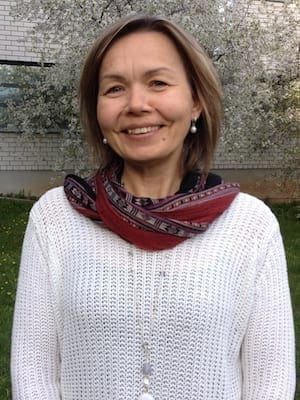Lebanon is a county of delicious food and boundless hospitality. I had an opportunity to experience both of these during a couple of days last week.
In addition, I enjoyed warm sunny weather and ripening grapefruits and mandarins at hand, which, I am sure, makes everybody from the Nordic hemisphere think that this must be heaven.
Sitting on the terrace of the Arab Baptist Theological Seminary and sipping “thick” Turkish coffee after a wonderful lunch, it is hard to grasp all the burdens with which this country is loaded.
Lebanese Society for Education and Social Development (LSESD) was one of the first nongovernmental organizations that started to address the needs of Syrian refugees, who began to cross their country’s borders in 2011.
Since then, LSESD has developed, together with local Baptist churches, different programs to assist the Syrian people who have escaped the extreme conditions caused by the military conflict in their homeland.
Financial means for the programs have been donated by approximately 30 donors, who were invited to the consultation in Beirut from Nov. 9-11 to discuss the current situation in Lebanon, meet the local people and become familiar with the LSESD programs.
Several high-level officers from different organizations were invited to contribute to the consultation program. Here I refer only to a few of them.
However, the fact that a number of leading officers were present at the consultation shows the credibility of LSESD in the Lebanese society and the trust that they have built when serving the Lebanese people as well as refugees through their different programs.
One of the consultation speakers was Ibrahim Kenaan, member of the Lebanese Parliament. He gave an honest overview of the political, economic and social developments in the country.
I imagine it is not easy for a parliamentarian to admit publicly that his country’s internal politics has always been a problem, its elections contradictory, and that there has been no state budget since 2005. Lebanon needs time to recover.
Lebanon needs time to recover from the long civil war that lasted from 1975 until 1990, from the Syrian occupation from 1976 until 2005, and the military conflict with Israel in 2006.
Yet there is no time to build up the country when the neighbors are in need – neighbors from Syria that used to be the oppressors but are now knocking on their doors and begging for help.
Several speakers of the consultation mentioned the fact that Syrians, and recently also Iraqis, are coming to Lebanon not because life is better there but because they have no other choice if they want to survive.
Nabil Costa, executive director for LSESD and member of the European Baptist Federation executive committee, said in his opening speech to the consultation participants, “Our responsibility is to show compassion to the conflict victims because we, as Lebanese, know what it means to lose home, we know what is trauma, what it takes to live without electricity, how it feels to be stateless and to lose identity. This is why we want to show compassion.”
In showing compassion, the LSESD staff and local churches do not distinguish between people of different religions or social statuses. All are accepted. This is what Jesus taught and did.
Jean Marie Garelli from the United Nations High Commission for Refugees, who was also one of the consultation speakers, stressed the fact that the Lebanese welcoming attitude toward Syrian refugees is exceptional and truly remarkable. This is what makes the difference for those seeking refuge.
One such example is Zahle Baptist Church that, in cooperation with LSESD, is running different programs for the Syrian refugees – food distribution, English classes for adults, school for children.
All programs are run with love and care and excellent administration that value each person.
The church has opened a school for Syrian children so that they could continue their education.
The school follows the Syrian public schools’ program, which enables the children to continue their education without a major gap.
The children love their school; they sing, laugh and look happy. When the school holiday comes, they don’t want to stop because it is much better to study in the school than to spend the days in grim refugee camps.
But when one of our consultation participants asks from one class whether they miss Syria, all children raise their hands.
Each of them, without exception, wants to go back to Syria; this is their home and they miss it. When will this day come?
 Helle Liht is the assistant general secretary at the European Baptist Federation. A version of this article first appeared on Europe Matters, the blog of EBF general secretary Tony Peck. It is used with permission. You can follow Liht on Twitter @HelleTweet, Peck @EBFGS and EBF @EBFNews.
Helle Liht is the assistant general secretary at the European Baptist Federation. A version of this article first appeared on Europe Matters, the blog of EBF general secretary Tony Peck. It is used with permission. You can follow Liht on Twitter @HelleTweet, Peck @EBFGS and EBF @EBFNews.
Editor’s note: A photo news story of the LSESD relief consultation is available here.

